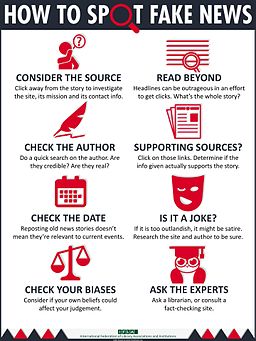Research Skills for Successful Assignments
Research Skills for Successful Assignments
Evaluating sources of information

Before you use any information to answer your assignment it is important to evaluate it.
One way to do this is to use the CRAAP test.
You need to assess its currency, relevance, authority, accuracy and purpose (the CRAAP test)
The test is a list of questions to help you evaluate the information you find.
Different criteria will be more or less important depending on your situation or need.
Currency: The timeliness of the information.
- When was the information published or posted?
- Has the information been revised or updated?
- Does your topic require current information, or will older sources work as well?
- Are the links functional?
Relevance: The importance of the information for your needs.
- Does the information relate to your topic or answer your question?
- Who is the intended audience?
- Is the information at an appropriate level (i.e. not too elementary or advanced for your needs)?
- Have you looked at a variety of sources before determining this is the one you will use?
- Would you be comfortable citing this source in your assignment?
Authority: The source of the information.
- Who is the author / publisher / source / sponsor?
- What are the author's credentials or organisational affiliations?
- Is the author qualified to write on the topic?
- Is there contact information, such as a publisher or email address?
- Does the URL reveal anything about the author or source (examples: .ac.uk .com .edu .gov .org .net)?
Accuracy: The reliability, truthfulness and correctness of the content.
- Where does the information come from?
- Is the information supported by evidence?
- Has the information been reviewed or refereed?
- Can you verify any of the information in another source or from personal knowledge?
- Does the language or tone seem unbiased and free of emotion?
- Are there spelling, grammar or typographical errors?
Purpose: The reason the information exists.
- What is the purpose of the information? Is it to inform, teach, sell, entertain or persuade?
- Do the authors / sponsors make their intentions or purpose clear?
- Is the information fact, opinion or propaganda?
- Does the point of view appear objective and impartial?
- Are there political, ideological, cultural, religious, institutional or personal biases?
(Copied, with minor alterations, from: http://library.csuchico.edu/help/source-or-information-good )
Printed sources
Books, journals and magazines are usually put through an editing process to ensure they meet these standards.
When you are looking for information you can use the following techniques to evaluate printed resources:
- Check the contents pages, the “blurb” on cover, and the introduction to evaluate if it is relevant to your topic
- Consider whether the author and publisher are reputable, check with your lecturer if you're not sure
- Check the date to assess how up to date it is, consider whether this is important for the topic you are researching
- Academic journal articles and some books have an abstract, which summarises the content, you can use this to assess how useful it is
- Check any references to see if the authors are using reliable sources themselves
- Skim read relevant sections before you commit too much time to reading it thoroughly
- When you have decided it is useful, read actively and critically
- Try using the SQ3R technique (survey, question, read, recall, review) to consolidate your understanding
- Take meaningful notes that you can use when you come to write up your assignment
- Don't forget to take down all the information you need to reference it
Online sources
You can find ebooks and journal articles online. Use the techniques above to evaluate their reliability and relevance.
Websites need careful evaluation.
This tutorial from Cardiff University Library Service points out some of the things to consider.
Evaluating the evidence: Assessing the quality of your sources
Here are links to the Cardiff University Library Service web page evaluation checklist:
Cardiff University web site evaluation checklist - Word
Cardiff University web site evaluation checklist - PDF
"It is in the nature of an open collaboration and work-in-progress like Wikipedia that quality may vary over time, and from article to article. While some articles are of the highest quality of scholarship, others are admittedly complete rubbish. Also, since Wikipedia can be edited by almost anyone anytime, articles may be prone to errors, including vandalism. So please do not use Wikipedia to make critical decisions. This encyclopedia is especially useful for improving familiarity with a subject and its jargon, and for learning search terms with which to further explore a subject beyond Wikipedia. Helpful external links are also provided to assist you in learning more."
Ten things you may not know about Wikipedia
Spoof websites
Tree octopus

http://www.bbc.co.uk/news/education-41902914
Indiana State University - How to identify and avoid fake news
Referencing and plagiarism
Find out more about this in the next section. Use the arrow on the right.
